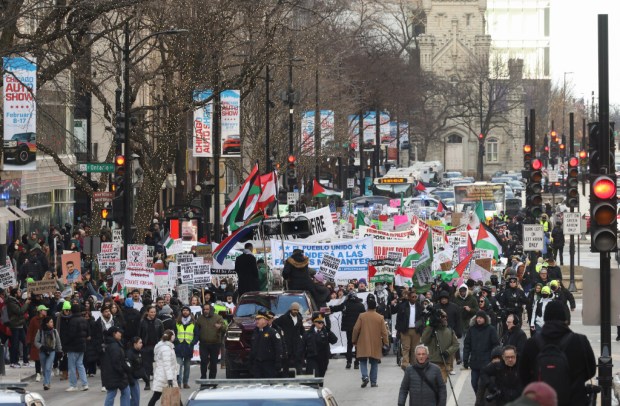Four local immigrant advocacy groups sued the U.S. Immigration and Customs Enforcement and two federal officials, seeking an injunction prohibiting certain types of immigration raids in Chicago.
The suit filed Saturday in U.S. District Court asks that a federal judge prohibit ICE, its acting head and the acting secretary of Homeland Security from conducting immigration raids in Chicago when the intention of the raids chills free speech. Specifically, the groups are asking the court to prohibit immigration raids intended to quash activism related to advocating for sanctuary city policies.
Immigrant communities in Chicago are scared but don’t want to live in fear, Antonio Gutierrez of Organized Communities Against Deportation, one of the groups that sued, said in a news release.
“The impending raids are a brazen attempt to stomp out the sanctuary city movement and run roughshod over the First Amendment,” Sheila Bedi of Northwestern University’s Community Justice Clinic, which is representing the groups, said in the release. “Our communities need organizers’ vision and advocacy now more than ever. This lawsuit is about prohibiting the Trump Administration from using law enforcement to decimate a vital social justice movement.”
An ICE spokesperson said the agency does not comment on ongoing litigation.
Ahilan Arulanantham, faculty co-director of the Center for Immigration Law and Policy at UCLA’s law school, views the lawsuit as an attempt to scrutinize the constitutionality of statements made by President Donald Trump and those around him since the start of his 2024 presidential campaign.
“The Trump administration and the Trump campaign as well leading up to the election have made a number of statements with respect to immigration that seem designed to spread fear in immigrant communities,” Arulanantham said. “And the interesting thing about this lawsuit is that it seems to take those statements and subject them to constitutional scrutiny.”
Trump made mass deportations a signature pledge of his campaign, and he has often been critical of Chicago, which has some of the country’s strongest protections for people in the country without legal status.
Arulanantham said lawsuits against law enforcement action typically are brought after the action occurs, and that typically, challenging the motives of those bringing the action is difficult.
“But if the motives are stated plainly enough and the motives are unconstitutional, then they can be challenged,” Arulanantham said.
Arulanantham said the First Amendment clearly protects advocating for sanctuary city policies, speaking about them, holding protests, speaking in the press about them and doing political organizing around them.
“I would think if the government is going to have to respond to this, they may have to say something about what their plans are and what their reasons are, (which) could be contradicted by the statements that people like (border czar Tom) Homan are making or want to make in public,” Arulanantham said.
For Arulanantham, the suit brought to mind Trump’s signing of his “Muslim ban” in 2017. The Justice Department would say the executive order wasn’t a “Muslim ban,” and then Trump would turn around a tweet that it was, Arulanantham said.
This week, Trump reversed a policy that for more than a decade has prevented ICE from carrying out immigration enforcement in “sensitive locations,” such as health care facilities, day cares, churches and schools. On Friday, a reported sighting of immigration agents attempting to enter an elementary school on Chicago’s Southwest Side was Secret Service agents investigating a threat.
The Associated Press contributed.





